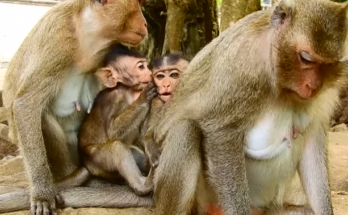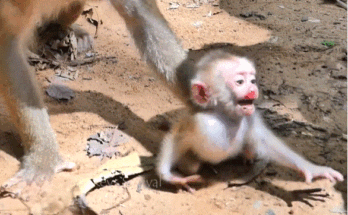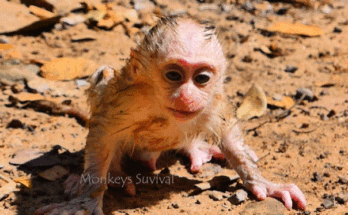Deep inside the ancient stones of Angkor Wat, where the jungle wraps its arms around the ruins, a fragile life clings to hope. The baby monkey, barely weeks old, sits trembling on the mossy ground, eyes wide with confusion. His little body, so small against the towering roots and temple walls, shakes not just from the chill of the evening air but from the shock of rejection.
His mother, Malika, once his only refuge, now turns her face away. Her hands, once gentle and protective, now push him aside with startling coldness. For anyone watching, the moment cuts deep. A mother’s rejection is something universal—whether human or animal, the sight of a little one being denied comfort feels unbearable.
At first, the baby doesn’t understand. He crawls closer, stretching his thin arms toward her belly, searching instinctively for the warmth of milk and the safety of her embrace. But Malika refuses. She lifts her face toward the trees, her body tense, almost annoyed. The baby collapses onto the stone, his tiny voice carrying a desperate whimper.

For a few moments, the forest seems to pause. The rustle of leaves, the chatter of other monkeys—all fade under the weight of that heartbreaking cry. It is the sound of innocence meeting rejection, of a small soul learning, too soon, that love can be denied.
For U.S. readers, it’s hard not to see reflections of our own world in this little monkey’s struggle. Many of us know the pain of wanting love and not receiving it, the ache of being turned away by the one we need most. In that baby’s eyes, wide and wet with longing, we see the face of every child—human or not—who has ever pleaded silently for comfort.
Why did Malika turn away? The reasons, hidden in the instinctive world of the forest, remain a mystery. Perhaps she is tired, overwhelmed, or caught in some natural rhythm that forces her to wean too soon. But reasons do not soften the image of her tiny child, left alone in the shadow of stone and roots.
As he tries again, reaching, pressing his face against her, Malika’s rejection grows sharper. She pushes him off with a firmness that seems almost cruel. Viewers around the world, watching the viral clip, feel their hearts break in unison.
Yet in this sorrow, there is also resilience. The baby monkey doesn’t stop. Though heartbroken, he keeps trying—nudging her side, sitting close, waiting for just one more chance at love. His persistence reminds us of something deeply human: even in the face of rejection, hope lingers. We long for connection, for warmth, for love—even if we must fight for it with every ounce of our being.
In the Angkor Wat forest, as night begins to fall and the temple stones glow gold under the fading sun, the baby curls up near Malika, still close though not embraced. Perhaps tomorrow she will soften. Perhaps not. But tonight, his story echoes across the world, reminding us that love—its presence or absence—is the most powerful force we know.
This single moment, captured and shared, is more than just a scene of wildlife. It is a mirror, showing us both the fragility of life and the resilience of hope. And in that tiny monkey’s cry, we hear the same plea we all carry in our hearts: Don’t leave me. Hold me. Love me.


